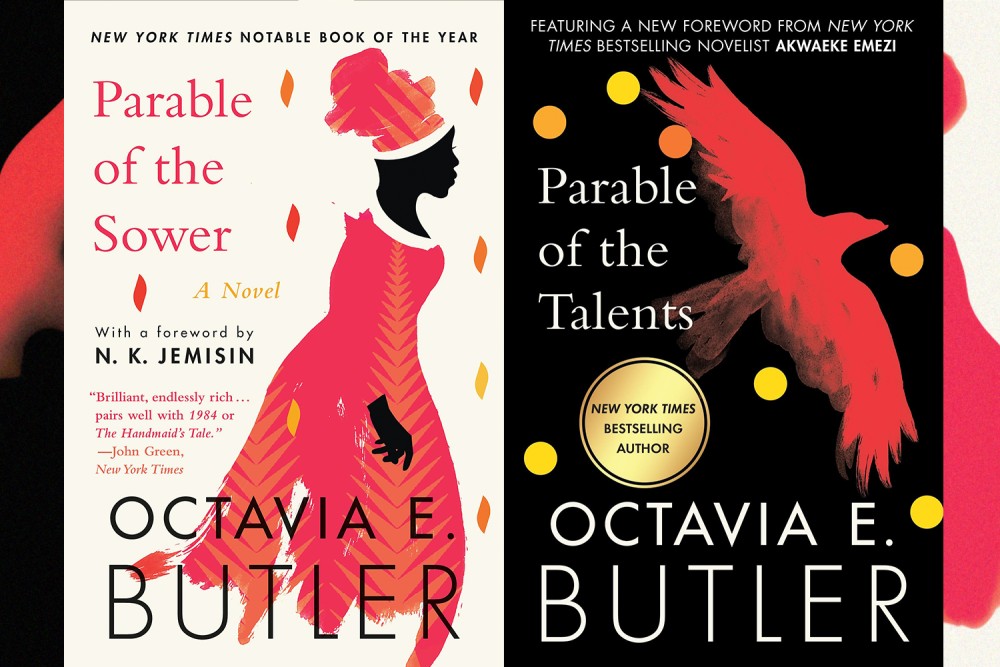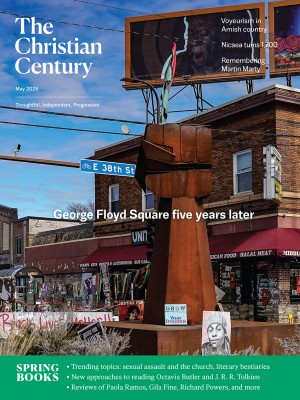The wisdom of Earthseed
In the Parable novels, Octavia Butler imagines not just a dystopian future but also a way to survive it.

The dystopian America Octavia Butler imagines in her novels Parable of the Sower and Parable of the Talents, both written in the 1990s, is eerily familiar—a failing education system, the dissolving of public trust, rising Christian nationalism, fires raging across California, all of it overseen by a president who wants to “make America great again.”
In “A Few Rules for Predicting the Future,” originally published in Essence in 2000, Butler reflects on an encounter with a student at one of her book signings. The young man asked her if she believed that her troubled visions of the United States would someday come true. She responded, “All I did was look around at the problems we’re neglecting now and give them about 30 years to grow into full-fledged disasters.” Butler observed the mishandling of climate change, rising socioeconomic disparity, and heightened racial and political tensions, and she imagined a future that followed the natural consequences of neglecting these issues. Drawing on her knowledge of historical patterns, she predicted America’s slide into fascism, down to the exact words of the regime’s slogan.
Read our latest issue or browse back issues.
In preparation to write the second book of the Parable series, Butler researched pre–World War II Germany’s transformation into a fascist country. She pored over the way “Hitler and others bludgeoned and seduced,” along with the way the “Germans responded to the bludgeoning and the seduction.” Her goal was to understand how a government could manipulate normal people to “either quietly or joyfully watch their neighbors ruined, spirited away, [or] killed.”
Drawing parallels between her novel and the Third Reich, Butler warned that “it’s easy enough to spot this horror when it happens elsewhere in the world or elsewhere in time. But if we are to spot it here at home, to spot it before it can grow and do its worst, we must pay more attention to history.”
Parable of the Sower begins in the year 2024. The narrative unfolds through the diary entries of Lauren Oya Olamina. Like Butler, Lauren pays attention. She notices poverty levels rising drastically. Most people cannot afford food or basic shelter. There is no running water or electricity. Those who can afford to do so build tightly insulated communities with large metal gates to protect themselves from the resulting violence. She was born into one of these neighborhoods, in the fictional town of Robledo.
Robledo was inspired by Butler’s real hometown—Altadena, California, which was left in ashes after the wildfires this January. As videos went viral of people fleeing Los Angeles, saving only what they could carry in their hands, many noted how uncanny it was that Butler’s Altadena had been lost to the flames, just as Robledo burns in her book.
It’s not difficult to imagine how even more of Butler’s troubling visions will play out in our world. As Lauren writes in her diary,
I have watched as convenience, profit, and inertia excused greater and more dangerous environmental degradation. I have watched education become more of a privilege of the rich than the basic necessity that it must be if civilized society is to survive. I have watched poverty, hunger, and disease become inevitable for more and more people.
But Butler’s writings offer more than eerie predictions now being realized. Just as she saw what was coming, she imagined how we might survive it. A prophet like Lauren doesn’t just see the future; she is a visionary reformer.
In Parable of the Sower, Lauren invokes the parable of the persistent widow (Luke 18:1–8). The widow is persistent in demanding justice from a corrupt judge, even though he rejects her every single time. She keeps coming back, demanding change, and over time her single-minded persistence simply wears him down. This powerful judge, who “fears neither God nor man,” gives in to a powerless widow. “The weak can overcome the strong if the weak persist,” insists Lauren.
But what does it mean to persist? Lauren establishes a religion called Earthseed that she believes can teach humanity how to survive. It’s rooted in this belief: “God is Change.” Lauren believes change is an opportunity for people to reshape the world around them.
Butler imagined a future where America falls apart, but she also imagined a protagonist who helps to reconfigure the shattered pieces. Three of the principles of her imagined religion—which Lauren records in verse form—can be a compass for us now.
Belief
Initiates and guides action—
Or it does nothing.
“Crazy to live without a wall to protect you,” Lauren writes in one of her earliest entries. But Lauren is still able to hold space for another truth: those walls will someday burn down. She tracks the increasing fires. She notices more frequent attacks on walled neighborhoods. But her community continues to pretend they are safe where they are. Living in denial can feel safer—but it’s exactly this collective passivity that destroys their society.
Living within a fragile illusion of safety is an easier emotional burden to carry than accepting the truth. Lauren sees her walled community for what it is—a delay of what is inevitable—and she chooses to prepare for life in a world without walls. She prepares “grab and run” packs full of essentials to survive outside. She reads books on how to build log cabins and make soap. She teaches herself how to hunt, to skin pelts and furs, and to forage in the woods in search of edible plants. She buries money deep into the ground. She practices what to do in case of an attack. “I intend to survive,” Lauren writes. Rather than resigning herself to a doomed fate, Lauren’s beliefs guide her to concrete, pragmatic action to ensure her survival.
We must find the rest of what we need
within ourselves,
in one another.
After Robledo burns, Lauren returns home one last time to salvage toiletries, food, and clothing for life outside the walls. She finds two familiar faces—Harry and Zahra—on her way out. Neither friends nor family, the three band together out of necessity. Lauren offers to share her clothing with Zahra—who gains a new shirt, a pair of jeans, and two pairs of shoes. (“Shoes are expensive. Now she has two pair,” she writes in her diary.) Lauren could focus solely on her own well-being and hoard these resources, but she doesn’t. This kindness is ultimately what convinces Zahra to follow Lauren on her journey.
The trio ventures forth, and Lauren picks up other people—an orphaned child, two young sisters, a young couple with a newborn—along the way. Lauren doesn’t join with those who are physically strong or powerful in other ways, for she quickly realizes her natural allies are other vulnerable people. Each member shares an innate understanding that they cannot make it on their own in this world. Trust is crucial to survive. As trust slowly forms, their lives intertwine. This braiding is what makes them strong. They are motivated by a deep sense of responsibility toward one another.
“The weak can overcome the strong if the weak persist,” Lauren writes. But in order to persist, they must form good and faithful communities committed to reducing suffering and injustice. Simply banding together is not enough to be a beacon of light in troubled times. Interdependence must be formed within a community that believes in the inherent dignity of all human life, that cares not only for its members but also for the vulnerable on the margins. This is their best weapon against cruel policies designed to divide society. The diversity of the weak becomes their collective strength.
Once or twice
each week
A Gathering of Earthseed
is a good and necessary thing.
The group that gathers around Lauren forms a community called Acorn, which hosts weekly “Gatherings” for its members to connect with one another. All members must participate, and their purpose is reshaping the community, which Lauren sees as an evolving entity requiring constant maintenance. Commitment and ritual are what sustain unity.
In the same way Butler looked to the past to write about the future, Lauren encourages her community to reflect on their own past—the good and the bad. Acorn designates the first Gathering of each month as a “looking-back-looking-forward discussion” to contemplate how past actions have led to current realities. These first-of-the-month conversations are where they decide on necessary changes—which crops to grow, which books to teach the children in school, and how to expand their small economy. Reflecting on their past and acknowledging the realities of their present allows them to continuously search for ways to better themselves. For Earthseed, change is the only constant, so the community uses change as an opportunity to overcome challenges together.
In essence, Lauren and her followers survive because of their commitment to intentional interdependence within a larger faith community—one that is also committed to embracing change rather than stagnation. This posture is crucial in the face of apathy and overwhelm. We must stay in motion, taking the next right step together until the path ahead becomes clear.





